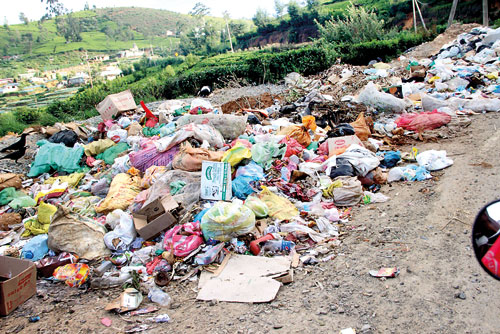News
Polythene: Strict enforcement of ban from January
Just when the angry reaction to the polythene ban appears to be waning and supermarkets are generously handing out High-Density Polythene (HDPE) bags to shoppers, the Central Environment Authority (CEA) has expressed its determination to fully enforce the law. The CEA said it had been working intensely since the gazette notification was published on September 1 this year.

Solid waste management has gone out of control in recent times
Solid Waste Management Director General J.M.U. Indraratne said the CEA had streamlined the moves to implement the ban and would check whether all manufacturers are complying with the 20 micron requirement. He said the CEA believed the implementation of the ban is expected to take place sooner than expected.
“Everything is in place — the plans and equipment — and we are waiting for the green light from our superiors,” he said.
The CEA, in an effort to find a sustainable solution to solid waste management which has gone out of control in recent times, issued a gazette notification banning the manufacture, use and sale of polythene of 20 microns or less, including lunch sheets.
The CEA, it is learned, had talks with stakeholders, including the Ministry of Commerce and Industry, Customs, the Sri Lanka Standards Institution and manufacturers. “Issues have been resolved and now we have to act,” Mr. Indraratne said.
The Customs Department has been advised of the restriction on raw material imports while the Ministry of Industry will be giving small and medium scale industries assistance for the modification of machines to manufacture Low-Density Polythene (LDPE) products.
Two weeks before the gazette was issued, the CEA had called on large-, medium- and small-scale industries to register with the CEA to obtain National Environment Protection Licences that would regulate their future operations.
The CEA’s newspaper advertisements said that from January 2018, manufacturers of polythene of less than 20 microns and lunch sheets would face charges under the National Environmental Act, and businesses violating the law would be shut down. They could be sentenced to two years in jail, fined Rs. 10,000 or could face both.
This action would be taken in coordination with district secretaries, Pradeshiya Sabhas and the police.
Initially, the raids would be on those manufacturing polyethylene bags and products of less than 20 microns and lunch sheets. Later, other products such as polystyrene and rigifoam would be checked. Burning polythene and plastic in open places would also be prohibited.
The DG said there were also plans to discourage manufacturers from turning out LDPE products as this too was not bio-degradable. The Gazette notification covered HDPE, LDPE and polypropylene.
Meanwhile, polythene manufactures and recyclers said the industries were modifying their machines to manufacture LDPE products instead of HDPE products.
Manufacturers’ Association president Anura Wijetunge claimed that the Government had agreed to meet 50 percent of the cost of the modification.
There were around one thousand small- and medium-scale companies needing assistance for the change. Some of them have up to 25 machines. “We are spending our money and modifying the machines in the hope the Commerce and Industry Ministry will reimburse us,” he said.
The industries were awaiting the arrival of raw materials from overseas to start the manufacture of LDPE products, he said adding that for the manufacture of lunch sheets, the industry was looking at bio-degradable material such as corn starch from Europe, China, India and Malaysia. He says the cost of a lunch sheet would double because a ton of LDPE would cost around US$3,200 whereas HDPE raw material cost US$1,100 a ton.
According to him, the industries also want to clarify the guidelines on the manufacturing process. “The CEA needs to educate the manufacturers on compliance,” he said.
The Industries and Commerce Ministry said a Cabinet-approved proposal had been presented in Parliament on the type of assistance to be granted to the industry.
The ministry’s Additional Secretary M.A. Thajudeen said they were working with the Finance Ministry to include the proposal in the 2018 budget.
“We are looking at giving them soft loans in the importation of raw materials and technical guidance,” he said.

